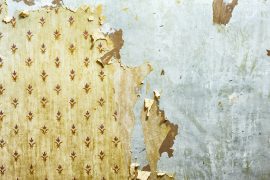Matt Runkle
No one could remember at what point the offensive material first appeared in the faculty lounge. As far as Mrs. Trent could tell, it had always been there, and had always looked ancient too, deeply incised in the wall and clogged with oil and dust. It certainly appeared that way thirty-two years ago, when Mrs. Trent—hard to imagine, a young woman—entered the dingy room and took a brisk look around. She approached the material with a curiosity only afforded youth, and ran her finger down the length of it. She was uncommonly nearsighted back then, and when she detected a microscopic smattering of lavender eggs nestled among the grime, she thought it best to keep her yet supple mouth shut. She’d heard of the strange discomfiture that school boards could get, a panic that spread like pâté, and Mrs. Trent valued above all else the security of knowing one can fly before taking sudden leaps.
In the years following, as Mrs. Trent established her classroom and went through the rapid hardening all teachers do, she continued to keep tabs on the offensive material, and having willed herself into a casual awareness, was the first to notice the glow that occurred in the wake of the tiny hatchlings, the bright rivulets that began to maunder along the material’s canals. Before long, drapes of meadowish molds appeared. Slightly more mobile than typical flora, they trembled, and soon turned a vernal shade of pink that was hard for the rest of the faculty to ignore. None of the other teachers, though, was any more wont to stir the pot than Mrs. Trent, and as the school board was loath to enter the lounge, the growths flourished unhindered for years.
Mrs. Trent, intent now on her cigarette, grimaces as the lush cascades swing in the wake of her breath. Roused by the nicotine, they heighten, slightly, the volume of their hum.
A muddled knock at the door makes Mrs. Trent glad to have invested in a sturdy lock. Ever since last week’s shooting, the school board has been encroaching, dazedly persistent, like a neutered hound around a bitch in heat. The air in the school at large has shifted, congealing in a chalky way, the salt coming forth from the sulfur, the way an egg reacts upon being dropped into a boil. It’s such a strange place now in which to watch the adolescents stew, their hormones calcifying prematurely, their tension becoming electric, their cynicism taking oversoon root. Fear has made them old—and stimulated—in a way that strikes a startling chord with Mrs. Trent.
Meanwhile, their parents, lurking about the school’s osmotic borders, have been on a somewhat more sluggish track. By the time the bodies were being carted away, half the faculty had resigned, but rather than shame these deserters, the board was sending them off with supportive notes. It wasn’t until yesterday that any sort of witch-hunt was undertaken, and even yet, it’s been a languorous sort of affair, dead on its feet, as when one wakes the morning after a good binge. So much for the torch-bearing school boards of yore.
A knock again, indolent and arrhythmic. Mrs. Trent’s exhale bears an underlying rasp of disgust. If they really wanted in, they’d have raised an ax, wouldn’t they? Such a trite epiphany they must be having, one they’re so much slower to realize than their young: the colors they once thought to throb have all along been painted by rote.
She imagines pulling the bucolic molds out by their offensive roots. She imagines taking a bullet for one of her students. What, after all, is a teacher’s duty? To prevent violence? Or simply to present it as it is? It’s webbed so deep and so thoroughly, and though the students have arrived at its very edge, they’ve taken on the full weight of its rotted core. Some, of late, have even complained of the taste of blood at the tips of their teeth—their own blood, not that of others. They are innocent. We all are, but innocence just isn’t enough anymore.
If it were another time, Mrs. Trent thinks, she would be a virgin. She would commit herself to God. Her work would be to tend the convent’s poultry yard, and she would feel the sun on her face and the seeds in her hand, and would be so free of demands she could close her eyes and become cloth.
Matt Runkle’s work has been featured in The Collagist, on BOMBlog, and is forthcoming in Beecher’s. One of his stories was a finalist last year for the Calvino Prize. His novel, TWOS, was a 2011 semifinalist for the Noemi Book Award. He also illustrates comics and makes limited edition artist’s books. You can visit his website at matt-runkle.com


